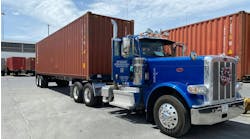I've always tried to be an asset for the company,” says Joe Nemeth, driver for Kellogg Co. and a winner of NPTC's Driver All-Star Award in 2010. Nemeth is one of 1,100 DOT qualified drivers working in the company's private fleet, which handles some 95% of Kellogg's direct store deliveries. While most drivers have worked for the company a dozen or more years, Joe's tenure is more than 20 years.
“Safety is a very high priority for us, and I try to live up to the company's high standards. We take the safest — not necessarily the shortest — route on our runs,” says Nemeth. Founded in 1906, Kellogg began as a cereal manufacturer and has since grown its line into hundreds of food products. This diversification is reflected in the typical load delivered by Joe each working day. When he first began working for the company, he delivered only cookies. Today, he delivers a wide range of snack foods, including cookies and crackers. Another change is the number of stops. “When I started with Kellogg, I made 20 to 25 stops per day. There were just a lot more grocery stores around then compared with today where stores are fewer but much larger. Now, I make 10 to 12 stops, but my loads are larger and more complex.”
Some 40 to 50% of Joe's workday is non-driving. His Monday through Friday workweek starts each day between 1 and 2 a.m. and ends midafternoon no later than 4 p.m. for a 10- to 11-hour day. His truck is already loaded when he begins his shift. The main part of the non-driving portion of the job is moving products off the truck and floor stacking them in retail stores. “It's important to organize the products to help the store and help our sales representative, who places the product on the store shelves,” says Joe. Accuracy of product inventory and verification in the receiving process are part of the driver's responsibility. Delivery schedules have tightened up at stores, so much so that getting in and out of the store quickly and safely is critical to a driver's work. “We have a very good rapport with the stores,” says Joe.
Managing the company's private fleet is Brett Quigley, associate director of transportation. “We have 800 power units and 1,200 trailers making deliveries from 43 distribution centers located throughout the United States,” explains Quigley. “Top quality drivers like Joe are a key part of our service pledge to customers.” Even with high levels of performance in terms of on-time, accurate and safe deliveries, the Kellogg private fleet operates in a continuous state of justification. “We can take no success for granted and are always looking for ways to improve,” he says. “NPTC has proven to be a great resource of help.”
Beginning shortly after Quigley joined Kellogg several years ago, he encouraged team members to get actively involved in the Council's programs and services. “I took the first step and was our initial candidate to go through the Private Fleet Management Institute and the Certified Transportation Professional program.” Having worked in the trucking industry for some 30 years, Quigley certainly has seen “everything under the sun” that it takes to operate a successful trucking operation.
“What I especially value about NPTC is its culture of learning — a manager can see a whole range of solution options from a wide variety of companies. At NPTC, you can learn many things from a different perspective and see how other companies come up with creative and innovative choices with better results in overall fleet performance. What NPTC gives is visibility to new and ever-unique approaches and always-changing best practices,” says Quigley.
Gary Petty is president and CEO of the National Private Truck Council. The council's website is www.nptc.org. His column appears monthly in Fleet Owner.



